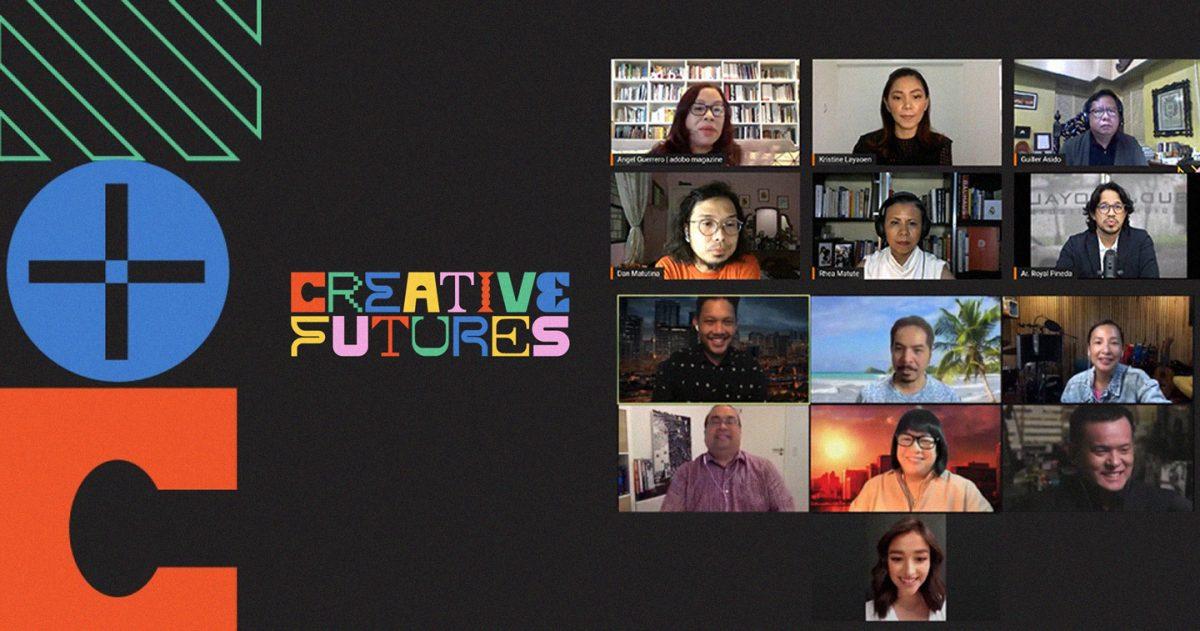MANILA, PHILIPPINES — The Center for International Trade Expositions and Missions (CITEM) from June 28-29 welcomed 1,824 attendees at Creative Futures, the agency’s flagship event and digital conference geared toward the development of the country’s promising creative economy.
To open the event, Department of Trade and Industry (DTI) Secretary Ramon Lopez, Undersecretary for the Trade Promotions Group (TPG) Abdulgani Macatoman, and CITEM Executive Director Pauline Suaco-Juan outlined DTI initiatives specifically for the future of the creative industries, and how the creative sectors have also contributed to the country’s growth.
“These economic contributions are what inspired the name of the conference. In business, ‘futures’ represent long-term commitments to both the quality of product or service between the parties and the trust that is inherent in that business relationship,” Suaco-Juan explained. “Creative Futures aims to leverage and build on the quality of creatives we have in the country to make more partnerships in a wider market and to grow our economy by supporting the development of this industry,” she shared in her remarks.
Congressman Christopher De Venecia presented the Creative Industries Act, the signature legislative piece of the Arts and Culture and Creative Industries Bloc (ACCIB), of which he is the lead convenor. De Venecia summarized the ongoing work to push the creative agenda in the bureaucracy through COLLAB: Coordination, Organization, Local creativity, Long-term planning, Aid and promotion, and Business Development.
Authored by De Venecia and filed by ACCIB, the bill aims to provide an enabling policy and governance framework that will shape the Philippine creative industry, make it globally competitive, and ensure a sustainable future for the country’s local talents.
“If we want creatives to help us create a better world, then we need to help creatives. By helping them, we help everyone as well—our business, our culture, our country,” De Venecia stressed. “We need to come together as a community to create a future where the kids of today would want to be the creatives of tomorrow,” he added.
Under the leadership of Speaker Lord Allan Velasco, who is a staunch advocate of Filipino creatives and a member of ACCIB, the House of Representatives also sponsored participation fees for Creative Futures.
The panel on esports echoed the need for policy support. The global phenomenon not only saw the emergence of star players from the Philippines but also a new source of profitable content via streams of gaming sessions and other ventures.
Tier One Entertainment CEO Tryke Gutierrez envisions an economic zone for esports and technology, akin to Silicon Valley, which could establish the Philippines as a center for growth in the sector. “There needs to be policies in accepting foreign capital and frameworks on foreign investment for esports,” Gutierrez said.
“With the help of the government and as the esports community continues to grow, we can have more people coming to the Philippines,” Mara Aquino, who pivoted from a career in traditional broadcast to shoutcasting for esports events, added.
Game Development Association of the Philippines Chair Alvin Juban, Gariath Concepts Vice President for Business Development Ralph Aligada, and Philippine Esports Organization (PESO) Deputy Executive Director Marlon Marcelo also forecast that the pandemic will also accelerate the recognition of the industry’s agenda, and noted the potential of the Philippines to become a center of esports talent in Southeast Asia.
Pivots powered by good design lead to triumph of business and creativity
In light of the unprecedented impact of the pandemic, Creative Economy Council of the Philippines (CECP) President Paolo Mercado delivered a keynote on the state of the Philippine creative economy, which likened the effect of the pandemic on business to the mass extinction of dinosaurs, and which outlined ways in which one can safeguard their craft; namely, by staying agile and resilient, and continuously adapting until a new area of growth emerges.
Creative Futures also featured Paalalabas, a COVID-19 campaign described by its proponents as a “nudge” for citizens to be mindful of the simple measures that can safeguard them during the pandemic. President, co-founder, and editor-in-chief of adobo Magazine Angel Guerrero moderated a panel with Intramuros Administrator Atty. Guiller Asido, Design Advisory Council Co-Chair Ar. Royal Pineda, Design Center of the Philippines Executive Director Rhea Matute, Curiosity Executive Research Director Kristine Layaoen, and Communication Design Association of the Philippines (CDAP) Vice President Dan Matutina where they discussed the campaign from ideation to iteration in the Walled City.
“Paalalabas began with the question, ‘How can we bring in design and how can we respond right away?” Pineda shared. “Design-wise, the whole team was inspired by our hearts as Filipinos,” he added, sharing that typical behavior of Filipinos would make them more receptive to reminders, rather than warnings.
Co-founder of El Union Coffee and La Union’s Great Northwest Kiddo Cosio underscored the importance of design principles, as much as profit margins, in running a business in a crisis of such scope as the pandemic. “A rural migration out of the cities has helped sustain local businesses in town, and even gave birth to new ones,” Cosio explained. “What makes the La Union story and experience complete for visitors and residents alike isn’t only surfing, but the kind of neighborhood it has created: one filled with creativity, verve, and spirit.”
Local routes lead to global recognition
An inclusive and omnichannel approach to its various offerings, spanning content creation to retail, is what led homegrown social networking service KUMU to become the game-changing platform that it is today. Vice President for Marketing Victoria Herrera describes the KUMU community as “glocal,” where Filipino culture is championed and local creatives thrive.
“We’re all about supporting users and getting their content out to the world,” KUMU co-founder and Social TV Chief of Content Angelo Mendez said. “We want people to appreciate Filipino culture and I think KUMU is providing a space for that.”

The team responsible for Trese, an indie comic series that has been adapted by streaming giant Netflix, also headlined the conference, emphasizing the importance of intellectual property (IP) as the currency of the creative economy and a means to protect original content. Actress Liza Soberano, the voice of lead character, Alexandra Trese in the Filipino dub joined Trese co-creator Budjette Tan, director and showrunner Jay Oliva, and producer Tanya Yuson in a panel and watch party produced by Endslate.
In an aspirational talk, Whilce Portacio, known for his work in such titles as Iron Man, Uncanny X-Men, and Wetworks, also attributed his success as a comic book artist to maintaining a local standpoint in storytelling. “The world is waiting to hear our stories. Filipinos have millions of stories and now, we have to tell them,” he said.
Kidlat Tahimik closed out the conference, and likewise remarked on the need for a governing body that will consolidate all efforts to promote and preserve Philippine culture. According to the National Artist for Film, this will ensure that the contributions of cultural bearers and artists to the sustainability of various communities don’t go unnoticed.
DTI cites creative industries as agency priority
DTI officials also joined Suaco-Juan in signaling support for the different sectors of the creative industries and presenting action points of the department’s various agencies to capacitate Filipino creatives.
“The DTI is doing its part to support you under the Integrated Industry Development Program for the Creative Industries which provides a strategic direction for your development,” DTI Secretary Ramon Lopez said. “This would lead to improved competitiveness, enhanced capability, increased productivity, export promotion and development, and compliance to global standards for greater market access,” he added.
DTI Undersecretary for the Trade Promotions Group (TPG) Abdulgani Macatoman noted that beyond the conference, CITEM will make good on its goal to provide a trade industry platform for creatives through CREATE Philippines with an online promotions platform, createphilippines.com, where stories and news about different creative professionals, as well as projects and opportunities for the creative sectors are currently featured.
“This platform will be further developed to become a hub for creatives to showcase their portfolios, as CITEM bridges the relationship fostering commerce not only with local clients but open them up to an international audience,” Macatoman further explained.
On the second day of the conference, DTI Undersecretary for the Competitiveness and Innovation Group (CIG) Rafaelita Aldaba shared that the CIG’s Inclusive Innovation Industrial Strategy or I³S, which puts innovation at the front and center of trade and industry development policies, aims to help build a robust ecosystem in which creatives can thrive.
“We recognize the tremendous potential to generate high-value activities, employment, and contribute significantly to realizing our goal of inclusive and sustainable economic growth and development,” Aldaba noted. “Leveraging on our highly-skilled content artists and creators, and their use of new technologies, we can strengthen our position to adapt to the ongoing digitalization and the ever-changing landscape of the global creative economy,” she added.
Creative Futures is the flagship event of CREATE Philippines, CITEM’s trade industry platform for community building, knowledge-sharing, and networking among professionals, policymakers, and enthusiasts in the creative sectors. The fourth edition is directed by Erwin Romulo and is organized in partnership with the House of Representatives through the Office of the Speaker and ACCIB, the Creative Economy Council of the Philippines (CECP), KUMU, the APEC Global MSME Forum, and the Film Development Council of the Philippines (FDCP).
All talks and panel discussions are available for viewing at createphilippines.com








